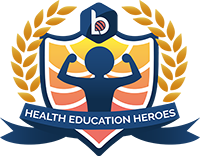About.
Imagine a future where every child leaves grade school with the knowledge, skills, and values to manage and nurture their health, and make responsible choices. This is what Health Education Heroes® is building.
Health Education Heroes® is on a mission to eliminate health illiteracy in this generation in partnership with teachers, parents, and health advocates.

Average US students receive 10 hours of health education per year with no systems to ensure consistency or validate learning.
National Health Education Standards from the Centers for Disease Control (CDC) recommend 80 hours of health education per student per year in grades 3 to 12, including mental health education. On average, U.S. students receive less than 10. Only 10% of middle schoolers get the recommended hours of health education, and only 6.5% of high schoolers do. Meanwhile, half of mental health issues begin by age 14 and 75% begin by age 24.
While health class should be a platform for health and wellness mastery, it’s often treated like an afterthought. Many schools leave health education up to the PE teacher without sufficient training, clear objectives, or up to date resources. Even full-time health teachers are often under-resourced and over-allocated. In addition, as a non-core academic subject, health teachers typically have less instructional time to achieve their objectives.
Using Lessonbee® as the enabling technology, HEH teachers usher unparalleled accountability into K-12 health and wellness education.

HEH students receive 40+ hours of health education every year with consistent delivery, tracking, and learning validation.
HEH was created to equip health teachers on the frontlines of the youth mental health crisis with the knowledge, resources, and support they need to maximize instructional time and increase student engagement.
Through a transformative combination of content, technology and capacity building, our heroes are able to overcome the typical hurdles to delivering comprehensive and culturally responsive health education.
HEH follows the REAP & SOW® framework. REAP & SOW™ is not a destination, but a model of continuous quality improvement. The REAP & SOW® model provides for meaningful inputs, clear outputs and data-driven instruction, transforming the health class experience.

REAP & SOW®
Relevant and emotionally affirming practices and student’s observed well-being.
REAP & SOW® was born of the necessity to create the conditions for meaningful health and wellness education – both health and social emotional learning – and to measure wellness outputs for young people as they progress through grades K-12. It’s an attempt to recognize the limitations of offering culturally responsive teaching and social emotional learning in isolation of each other, and resolve anxieties stemming from misapplication of both frameworks, through a a new model that is fundamentally data-driven rather than ideologically-driven.
REAP identifies the optimal learning conditions and practices to contextualize and experience wellness as a crosswalk of health knowledge and social emotional skills, so that students build lasting healthy habits. SOW is the measurement tool, allowing holistic assessment of overall student well-being.
The outputs measured in SOW – including pre-class and pre-unit assessments, check-ins, SEL- aligned benchmarks – impact the inputs in REAP, such as aligned health and SEL content and context, individualized and differentiated instruction in wellness education, trust building practices, and wellness interventions.
Much credit is due to the work of Zaretta Hammond and her book Culturally Responsive Teaching and the Brain. Some of the practices listed below as concrete examples of REAP are also culturally relevant practices, including: self-awareness, learning partnerships grounded in trust and respect, community building, and asset-based thinking.
What distinguishes REAP from CRT or Culturally Responsive Teaching is that REAP is fundamentally about integrating the crosswalk of health education and SEL, i.e. skills, with the content and context (knowledge) that leads to comprehension, and most importantly the centering of identity – knowing what is acceptable and true for yourself – as opposed to only culture: beliefs, norms, behaviors, and values that a given group of people deem acceptable.
Part of REAP is being culturally responsive and ensuring diverse learners feel incorporated into the content, but it’s also reaching individual learners and their diverse, intersectional identities and contextualizing wellness education specifically as the crosswalk of health and SEL to best meet learners’ needs.
Our founders.

Reva McPollom

Katie McPollom
